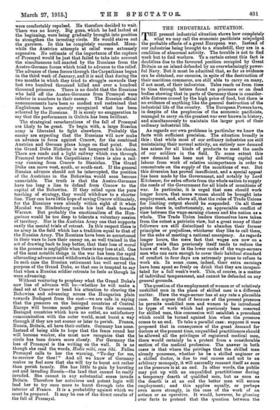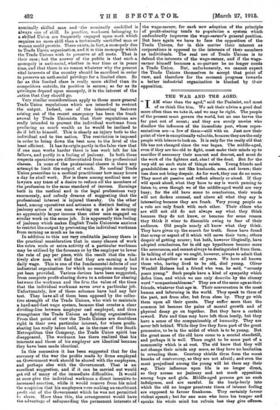THE INDUSTRIAL SITUATION.
T"present industrial situation shows how completely what we may call the economic pacificists misjudged the probable effects of a great European war. Instead of our industries being brought to a standstill, they are in a condition of abnormal activity. The trouble is not to find work but to find workers. To a certain extent this fact is doubtless due to the favoured position occupied by Great Britain as an island defended by an overwhelmingly power- ful Navy. But it must be admitted that, so far as evidence can be obtained, our enemies, in spite of the destruction of their maritime commerce, are still able to carry on many, if not most, of their industries. Tales reach us from time to time through letters found on prisoners or on dead bodies showing that in parts of Germany there is consider- able distress caused by the high price of food, but there is no evidence of anything like the general destruction of the industrial life of the country. The European Powers have, in despite of the prophecies of the economic pacificists, managed to carry on the greatest war over known in history, and simultaneously to maintain the larger part of their ordinary industrial life.
As regards our own problems in particular we know the facts with sufficient precision. The situation broadly is this : that while most of our ordinary industries are still maintaining their normal activity, an entirely new demand has arisen for all kinds of products to meet the needs of our soldiers in the field. To some extent this new demand has been met by diverting capital and labour from work of relative unimportance in order to concentrate on the supply of the munitions of war. But this diversion has proved insufficient, and a special appeal has been made by the Government, and notably by Lord Kitchener, for extra efforts from the whole nation to supply the needs of the Government for all kinds of munitions of war. In particular, it is urged that men should work longer hours, that more women should be brought into employment, and, above all, that the rules of Trade Unions for limiting output should be suspended. On all these points there is, unfortunately, an appreciable conflict of view between the wage-earning classes and the nation as a whole. The Trade Union leaders themselves have taken from the outset a patriotic view, but a great many of their followers are still disinclined to abandon their former principles or prejudices, whichever they like to call them, for the sake of meeting a national emergency. As regards longer hours, the mere fact that wages are now on a higher scale than previously itself tends to reduce the hours of work, for in the lower ranks of the wage-earners men who can earn enough to cover their habitual standard of comfort in four days are extremely prone to refuse to work six. In some ,cases, indeed, their extra earnings have been spent so freely on drink that they are incapaci- tated for a full week's work. This, of course, is a matter of individual temperament, and cannot be defended on any general ground..
The question of the employment of women or of relatively
unskilled men in the place of skilled men is a different matter. Here the wage-earner has at any rate a plausible case. He argues that if because of the present pressure he permits unskilled men and women to be introduced to types of work which had previously been reserved for skilled men, this concession will establish a precedent which could be turned against him when the pressure comes to an end. To take a parallel case : suppose it were proposed that in consequence of the great demand for doctors at the present time, unqualified practitioners should be allowed all the privileges of registered medical men, there would certainly be a protest from a considerable section of the medical profession. The answer in both cases is that where the privilege that the skilled man already possesses, whether he be a skilled engineer or a skilled doctor, is due to real causes and not to an arbitrary monopoly, it will assuredly reassert itself as soon as the pressure is at an end. In other words, the public may put up with an unqualified practititioner during a temporary dearth of qualified men, but as soon as the dearth is at an end the better men will secure employment; and this applies equally, or perhaps even more strongly, in the case of the work of an artisan or an operative. It would, however, be glossing over facts to pretend that the question between the nominally skilled mail and • the nominally unskilled is always one of skill. In practice, woi kinen belonging to a skilled Union are frequently engaged upon work which requires no more skill than a technically unskilled man or woman could provide. There exists, in fact, a monopoly due to Trade Union organization, and it is this monopoly which the Trade Unions wish to preserve at all costs. That is their case ; but the answer of the public is that such a monopoly is anti-social, whether in war time or in peace time, and that there is no reason whatever why the present vital interests of the country should be sacrificed in order to preserve an anti-social privilege for a limited class. So far as this limited class is really more skilled than its competitors outside, its position is secure; so far as its privileges depend upon monopoly, it is the interest of the .nation that they should go.
Very similar considerations apply to those more general Trade Union regulations which are intended to restrict the output. Indeed, one of the interesting features arising out of the recent emergency has been the frank avowal by Trade Unionists that their regulations are really intended to prevent the individual workman from producing as much wealth as he would be inclined to do if left to himself. This is clearly an injury both to the individual and to the nation. The restriction ie imposed in order to bring down the best men to the level of the least efficient. It has its origin partly in the false view that if one man works harder there is less work left for his fellows, and partly in a feeling of jealousy. In both these respects operatives are differentiated from the professional classes. In none of the professional classes is there any attempt to limit the output of work. No medical Trade Union prescribes to a medical practitioner how many hours a day he shall work. Nor is there among medical men or lawyers any trace of a desire to reduce all the members of the profession to the same standard of income. Earnings both in the medical and in the legal professions vary enormously, and nobody dreams of suggesting that the professional interest is injured thereby. On the other hand, among operatives and artisans a distinct feeling of jealousy arises if one wan working on a job is earning an appreciably larger income than other men engaged on similar work on the same job. It is apparently this feeling of jealousy which makes English Trade Unionists anxious to restrict the output by preventing the individual workman from earning as much as he can
In addition to this not very creditable jealousy there is the practical consideration that in many classes of work the extra scale or extra activity of a particular workman may be utilized by the foreman or by the employer to lower the rate of pay per piece, with the result that the rela- tively slow men will find that they are earning a had daily wage. This is one of the fundamental defects of our industrial organization for which uo complete remedy has yet been provided. Various devices have been suggested, from complete profit-sharing down to a scheme for sharing between the workman and the firm the value of the time that the individual workman saves over a particular job. Unfortunately, few of these schemes have had any fair test. They have all of them been opposed by the collec- tive strength of the Trade Unions, who wish to maintain a hard-and-fast wage system, because that creates a clear dividing-line between employer and employed, and thus strengthens the Trade Unions as fighting organizations. From that point of view the Trade Unions are doubtless right in their own particular interest, for where profit- sharing has really taken hold, as in the case of the South Metropolitan Gas Company, the Trade Union spirit has disappeared. The workman has there realized that his intermits and those of his employer are identical becalme they have been made identical.
In this connexion it has been suggested that for the curreucy of the war the profits made by firms employed on Government work should be shared with the employees, and perhaps also with the Government. That is an excellent suggestion, and if it can be carried out would get rid of many of the immediate difficulties. It would at once give the individual workman a direct incentive to increased exertion, while it would remove from his mind the suspicion that his employers were making an exurliiiant ['relit out of the Government which he was not permitted to share. More than this, the arrangement would have the advantage of safeguarding the permanent interests of
the wage-earner, for each new adoption of the principle of profit-sharing tends to popularize a system which undoubtedly improves the wage-earner's general position. But here again we have to face the opposition of the Trade Unions, for in this matter their interest as corporations is opposed to the interests of their members as individuals. The real use of Trade Unions is to defend the interests of the wage-earner, and if the wage- earner himself becomes a co-partner be no longer needs a Trade Union. But, unfortunately, we cannot expect the Trade Unions themselves to accept that point of view, and therefore for the moment progress towards a better industrial organization is blocked by their opposition.







































 Previous page
Previous page